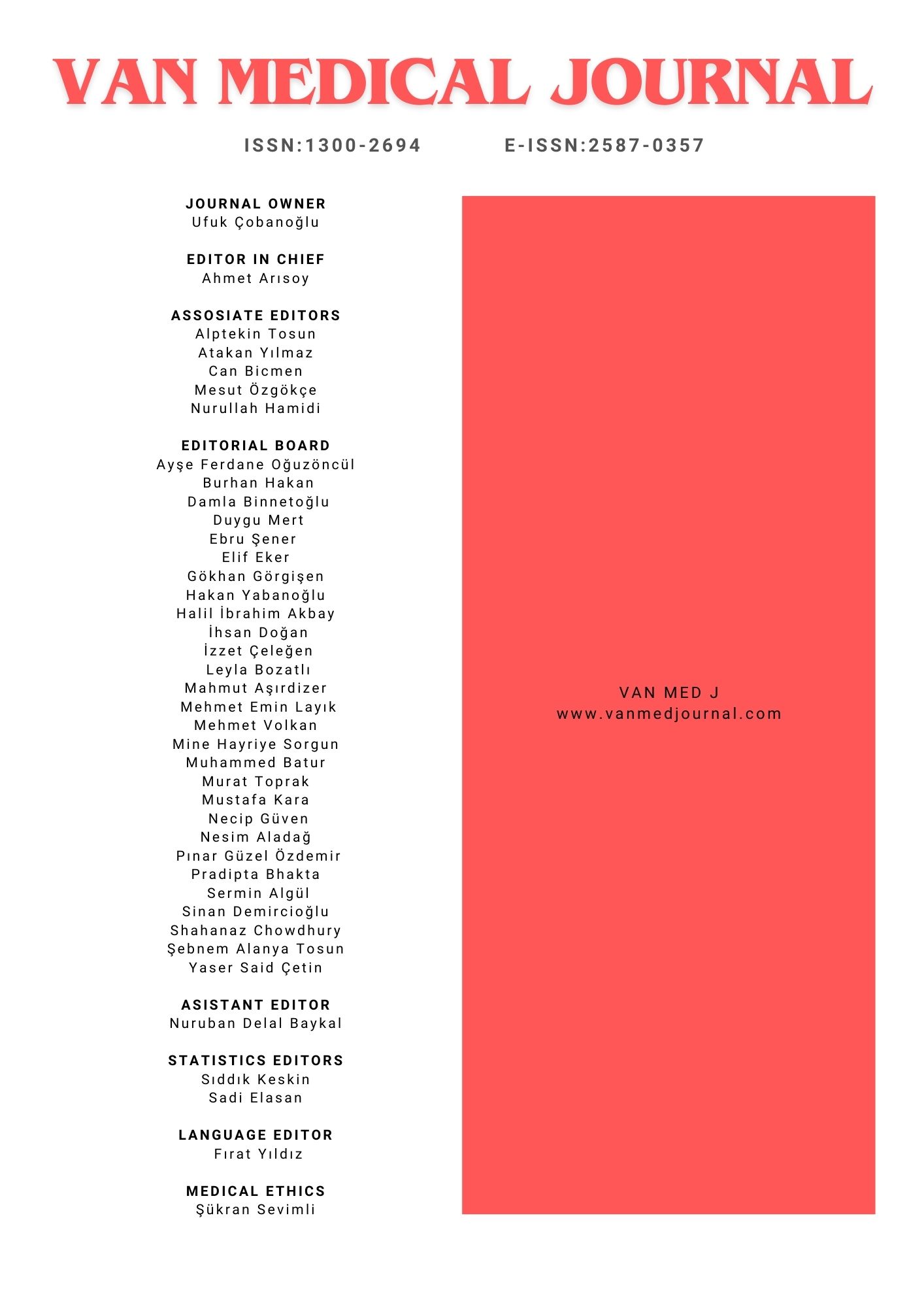Comparison of the effects of TENS and Electroacupuncture on the treatment of patients with chronic lumbar discal herniation.
Fahrettin Demirdağ1, Levent Ediz2, Ali Özgür3, İbrahim Tekeoğlu41SB Eğitim ve Araştırma Hastanesi, Fiziksel Tıp ve Rehabilitasyon Bölümü, Elazığ.2YYU Tıp Fakültesi Araştırma ve Uygulama Hastanesi, Fiziksel Tıp ve Rehabilitasyon AD, Van.
3Özel Ufuk Hastanesi, Fiziksel Tıp ve Rehabilitasyon Bölümü, Elazığ.
4YYU Tıp Fakültesi Araştırma ve Uygulama Hastanesi, Fiziksel Tıp ve Rehabilitasyon AD, Van.
Aim: In this prospective clinical study the aim was to evaluate and compare the efficacy of TENS and elektroacupuncture in patients with lumbar discal herniation. Method: Sixty patients (30 males, 30 females) who have low back pain for three months or more and were diagnosed to have lumbar discal herniation allocated into two groups randomly. Age range of the patients was 20-50 years. TENS was applicated to 30 patients of the first group, and electroacupuncture applicated three times weekly to 30 patients of the second group, in a total 15 sessions, each session lasting 20 minutes. All patients were evaluated at admission, just after the treatment, and one month after the treatment by following parameters; HFF (Hand-Finger Floor Distance), SLR (Smooth Leg Raising), Tenderness of Valleix Points, VAS (Visual Analog Scale), Oswestry Pain Disability Form and Low Back Pain Result Scale. Results: Statistically significant differences were not found in HFF, SLR, Tenderness of Valleix Points, VAS, Oswestry Pan Disability Form and Low Back Pain Result Scale parameters between the two groups (p>0,05). There was statistically significant improvement in these parameters just after the treatment compared with admission in both groups (p<0,05). This significant improvement continued one month after the treatment (p<0,05). Conclusion: In conclusion; in short term both TENS and electroacupuncture were found efficient in the treatment of lumbar discal herniation. We suggested that both TENS and electroacupuncture which can be used either combined with other physical therapy modalities or alone are efficient in the treatment of patients with lumbar discal herniation.
Keywords: Electroacupuncture, TENS, low back pain, discal herniation.
Kronik Lomber Disk Hernili Hastaların Tedavisinde Tens ile Elektroakupunktur Tedavisinin Karşılaştırılması
Fahrettin Demirdağ1, Levent Ediz2, Ali Özgür3, İbrahim Tekeoğlu41SB Eğitim ve Araştırma Hastanesi, Fiziksel Tıp ve Rehabilitasyon Bölümü, Elazığ2Yüzüncü Yıl Üniversitesi, Tıp Fakültesi, Fizik Tedavi ve Rehabilitasyon ABD, Van
3Özel Ufuk Hastanesi, Fiziksel Tıp ve Rehabilitasyon Bölümü, Elazığ.
4Yüzüncü Yıl Üniversitesi Tıp Fakültesi Fiziksel Tıp ve Rehabilitasyon Anabilim Dalı, Van
Amaç: Bu prospektif klinik çalışmada lomber disk hernisi tanısı almış hastalarda TENS ile elektroakupunktur tedavi etkinliğini değerlendirmek ve karşılaştırmak amaçlanmıştır. Yöntem: En az üç ay ve daha uzun süre bel ağrısı olup da; kronik lomber disk hernisi tanısı alan, yaşları 20 ile 50 arasında değişen 60 hasta (30 kadın ve 30 erkek) randomize olarak iki gruba ayrıldı. Birinci gruptaki 30 hastaya TENS, ikinci gruptaki 30 hastaya da elektroakupunktur tedavisi haftada üç kez 20 dakika, toplamda 15 seans olarak uygulandı. Hastalarda tedavi öncesi, tedaviden hemen sonra ve tedavi bitiminden bir ay sonra sırasıyla EPZ (El-Parmak Zemin Mesafesi), DBK (Düz Bacak Kaldırma), Valleix Noktaları Hassasiyeti, VAS (Visual Analog Skala), Oswestry Ağn Dizabilite Formu ve Bel Ağrısı Sonuç Skalası ölçümleri yapıldı. Elde edilen sonuçlar gruplar arası ve her iki grup kendi içinde istatistiksel olarak karşılaştırıldı. Bulgular: EPZ, DBK, Valleix Nokta Hassasiyeti, VAS, Oswestry Ağrı Dizabilite Formu ve Bel Ağrısı Sonuç Skalası değerlerinde karşılaştırılan iki grup arasında istatistiksel olarak anlamlı bir fark bulunmadı (p>0,05). Her iki grupta kendi içinde yapılan karşılaştırmalarda tüm parametrelerde tedavi öncesine göre, tedaviden hemen sonra istatistiksel olarak anlamlı düzelmeler saptandı (p<0,05). Bu anlamlı düzelme tedavi bitiminden bir ay sonra yapılan değerlendirmelerde de devam etmekteydi (p<0,05). Sonuç: Sonuç olarak hem TENS hem de elektroakupunktur lomber disk hernisi tedavisinde etkili bulunmuştur. Fizik tedavi modaliteleri ile kombine veya tek başına kullanılabilen TENS ve elektro akupunkturun bu alanda yararlı bir uygulama olduğu kanısına varılmıştır.
Anahtar Kelimeler: Elektroakupunktur, TENS, bel ağrısı, diskal herni.
Manuscript Language: Turkish

